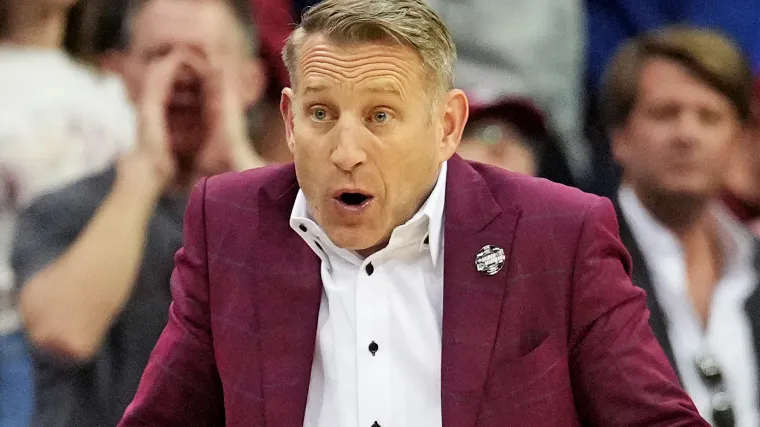Alabama head basketball coach Nate Oats has become one of the most talked-about figures in college basketball, not only for his success with the Crimson Tide but also because of persistent rumors and reports linking—and later unlinking—him to a prominent coaching vacancy. As the dust settles from the 2025 NCAA tournament, where Alabama made a deep and impressive run, speculation began swirling about Oats possibly being a candidate for a high-profile job opening at a major basketball powerhouse that fell in the Sweet 16. Though the conversation sparked widespread debate among fans and media alike, the story eventually took a turn, with sources indicating that Oats would remain in Tuscaloosa for the foreseeable future.
Nate Oats, who arrived at Alabama in 2019 after a successful stint at Buffalo, has quickly built the Crimson Tide into a national contender. Known for his up-tempo offense, aggressive defense, and analytics-driven approach, Oats has revolutionized Alabama basketball in a short period of time. Under his leadership, the Crimson Tide have consistently competed at the top of the SEC, earned high seeds in the NCAA tournament, and produced NBA-level talent. That success naturally drew the attention of programs looking to revitalize their own basketball traditions.
Following the Sweet 16 loss of a storied basketball school—one with multiple national championships and a rabid fanbase—attention turned to who might replace their outgoing coach, who either resigned or was dismissed following another season that ended short of expectations. Among the early names floated by national media and insiders was Nate Oats. The logic seemed to follow a clear line: here was a coach in his prime, fresh off another successful tournament run, with a proven ability to recruit, develop talent, and win at the highest level. His style of play was modern and appealing to both players and fans, and he had demonstrated the charisma needed to lead a blue blood program.
Reports began circulating across social media and major sports networks suggesting that Oats was a top target. Anonymous sources claimed that he had been contacted or at least informally approached. The speculation was further fueled by cryptic tweets, vague on-air comments by well-known analysts, and the ever-active college basketball rumor mill. Some pointed to Oats’ roots in the Midwest and his prior coaching experience at Buffalo as evidence that he might be interested in a change of scenery. Others highlighted the resources, legacy, and recruiting advantages that the vacant program could offer—perhaps more than what Alabama could match.
Yet for every whisper of a possible departure, there was an equal and opposite pushback from those close to the Alabama program. Oats himself remained tight-lipped, not addressing the rumors directly in the immediate aftermath of the tournament. Alabama athletic director Greg Byrne, however, quickly made it known that the university was committed to retaining Oats and would do everything in its power to keep him in Tuscaloosa. Byrne released a statement reaffirming Oats’ importance to the program and hinted that discussions were underway to ensure his long-term future at Alabama. This was not the first time Oats’ name had come up in coaching rumors, but Byrne and the administration had been consistent in their efforts to secure their coach with strong contracts and institutional support.
That support became concrete in the form of a restructured deal, reported by insiders to include enhancements not just in salary but also in program investment—facilities, assistant coaching salaries, and recruiting infrastructure. While the financial terms were not immediately disclosed, the message was clear: Alabama was not going to lose its coach without a fight.
As the coaching carousel continued to spin, momentum began to shift away from Oats being a serious contender for the open position. National reporters began walking back earlier suggestions, and some noted that Oats had not only declined to engage in any formal discussions with the unnamed program but had also reaffirmed his commitment to Alabama privately and internally. Eventually, a new coach was hired at the Sweet 16-exiting school—one with either a deep connection to the program or a similarly strong coaching resume, but not Nate Oats.
In the days that followed, Oats finally addressed the situation in a brief press conference ahead of an offseason event. When asked directly about the rumors, Oats said he was “fully committed to Alabama” and expressed appreciation for the administration, fans, and players. “There’s something special building here,” he said. “We’re not done yet.” He avoided directly naming the school in question or discussing whether he had been approached, but his tone was confident, resolute, and focused on the future in Tuscaloosa.
The saga—brief as it was—highlighted the precarious nature of coaching in today’s college basketball landscape. Successful coaches are almost always in demand, and programs with high expectations but disappointing results often look to make a splash with proven names. But it also showed the growing power of programs like Alabama, which in years past might have been considered a stepping stone or secondary option in the basketball hierarchy. Under Oats, Alabama has staked its claim as a legitimate national force. The university’s willingness to invest in basketball at the same level as football—traditionally the king of the SEC—sends a message to recruits and coaches alike that the Crimson Tide is a destination, not a detour.
Another factor in Oats’ decision to stay may have been the connection he has built with his current roster and recruits. Continuity matters in today’s era of the transfer portal and NIL, and players often follow coaches more than schools. Sources close to the program indicated that Oats was deeply involved in planning next year’s team and had already been in touch with potential transfers and high school prospects. Leaving now would have disrupted not only the program’s momentum but also relationships that had been carefully built over months and years.
Oats’ loyalty to Alabama may also be a reflection of personal values and long-term vision. While some coaches are drawn to legacy programs because of history and prestige, others prefer to build their own legacy where they are, establishing something uniquely theirs rather than walking in the footsteps of legends. Oats has often spoken about building a “sustainable culture of excellence” and has emphasized development, both on and off the court. Those are not just soundbites—they are pillars of his coaching philosophy.
In the end, the brief courtship that never quite materialized into anything real serves as both a testament to Oats’ rising stature and to Alabama’s ability to keep him. In an environment where coaching turnover is common and loyalty can be fleeting, the fact that Alabama was able to keep its man is a victory in itself. It stabilizes the program at a critical juncture, gives continuity to a fanbase energized by recent success, and allows Oats to continue pursuing the one thing that has eluded him so far—a national championship.
Whether that championship comes next season or beyond, Nate Oats will be chasing it in crimson and white. The rumors may have sparked headlines, but in the end, they only reinforced what Alabama fans already believed: they have one of the best coaches in the country—and he’s exactly where he wants to be.



